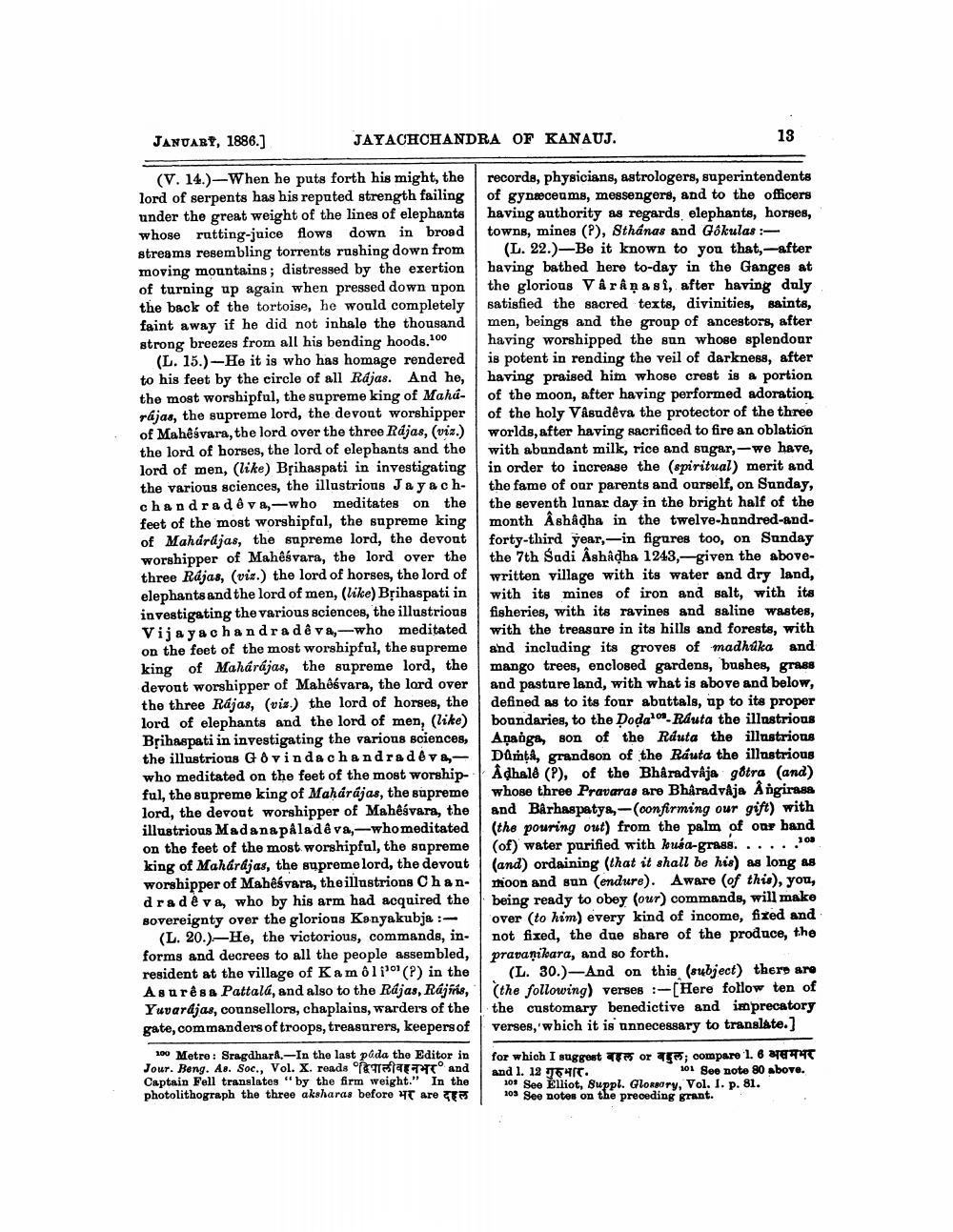________________
JANUARY, 1886.]
JAYACHCHANDRA OF KANAUJ.
(V. 14.)-When he puts forth his might, the lord of serpents has his reputed strength failing under the great weight of the lines of elephants whose rutting-juice flows down in broad streams resembling torrents rushing down from moving mountains; distressed by the exertion of turning up again when pressed down upon the back of the tortoise, he would completely faint away if he did not inhale the thousand strong breezes from all his bending hoods.100
(L. 15.)-He it is who has homage rendered to his feet by the circle of all Rájas. And he, the most worshipful, the supreme king of Maharajas, the supreme lord, the devout worshipper of Mahêsvara, the lord over the three Rájas, (viz.) the lord of horses, the lord of elephants and the lord of men, (like) Brihaspati in investigating the various sciences, the illustrious Jayachchandradeva,-who meditates on the feet of the most worshipful, the supreme king of Mahárájas, the supreme lord, the devout worshipper of Mahêśvara, the lord over the three Rájas, (viz.) the lord of horses, the lord of elephants and the lord of men, (like) Brihaspati in investigating the various sciences, the illustrious Vijayachandradê va,-who meditated on the feet of the most worshipful, the supreme king of Mahárájas, the supreme lord, the devout worshipper of Mahêśvara, the lord over the three Rájas, (vis.) the lord of horses, the lord of elephants and the lord of men, (like) Brihaspati in investigating the various sciences, the illustrious Govindachandradeva,who meditated on the feet of the most worshipful, the supreme king of Maḥárájas, the supreme lord, the devout worshipper of Mahêśvara, the illustrious Madanapåladê va,-who meditated on the feet of the most worshipful, the supreme king of Maharajas, the supreme lord, the devout worshipper of Mahêśvara, the illustrions Chandradeva, who by his arm had acquired the sovereignty over the glorious Kanyakubja :
(L. 20.)-He, the victorious, commands, informs and decrees to all the people assembled, resident at the village of Ka môli (?) in the Asurêsa Pattalá, and also to the Rajas, Rájms, Yuvarajas, counsellors, chaplains, warders of the gate, commanders of troops, treasurers, keepers of
100 Metre: Sragdhara.-In the last pada the Editor in Jour. Beng. As. Soc., Vol. X. reads and Captain Fell translates "by the firm weight." In the photolithograph the three aksharas before T are
13
records, physicians, astrologers, superintendents of gynæceums, messengers, and to the officers having authority as regards, elephants, horses, towns, mines (P), Sthánas and Gokulas:
(L. 22.)-Be it known to you that, after having bathed here to-day in the Ganges at the glorious Vârânasi, after having duly satisfied the sacred texts, divinities, saints, men, beings and the group of ancestors, after having worshipped the sun whose splendour is potent in rending the veil of darkness, after having praised him whose crest is a portion of the moon, after having performed adoration of the holy Vasudeva the protector of the three worlds, after having sacrificed to fire an oblation with abundant milk, rice and sugar, we have, in order to increase the (spiritual) merit and the fame of our parents and ourself, on Sunday, the seventh lunar day in the bright half of the month Ashâḍha in the twelve-hundred-andforty-third year,-in figures too, on Sunday the 7th Sudi Ashadha 1243,-given the abovewritten village with its water and dry land, with its mines of iron and salt, with its fisheries, with its ravines and saline wastes, with the treasure in its hills and forests, with and including its groves of madhuka and mango trees, enclosed gardens, bushes, grass and pasture land, with what is above and below, defined as to its four abuttals, up to its proper boundaries, to the Doda". Rauta the illustrious Ananga, son of the Rauta the illustrious Dumta, grandson of the Rauta the illustrious Adhale (P), of the Bharadvaja gotra (and) whose three Pravaras are Bharadvaja Angirasa and Barhaspatya,-(confirming our gift) with (the pouring out) from the palm of our hand (of) water purified with kusa-grass..... 108 (and) ordaining (that it shall be his) as long as moon and sun (endure). Aware (of this), you, being ready to obey (our) commands, will make over (to him) every kind of income, fixed and not fixed, the due share of the produce, the pravanikara, and so forth.
(L. 30.)-And on this (subject) there are (the following) verses :-[Here follow ten of the customary benedictive and imprecatory verses, which it is unnecessary to translate.]
for which I suggest बहल or बहुल; compare 1. 6 असमभर and 1. 12 गुरुभार. 101 See note 80 above. 103 See Elliot, Suppl. Glossary, Vol. I. p. 81. 103 See notes on the preceding grant.




